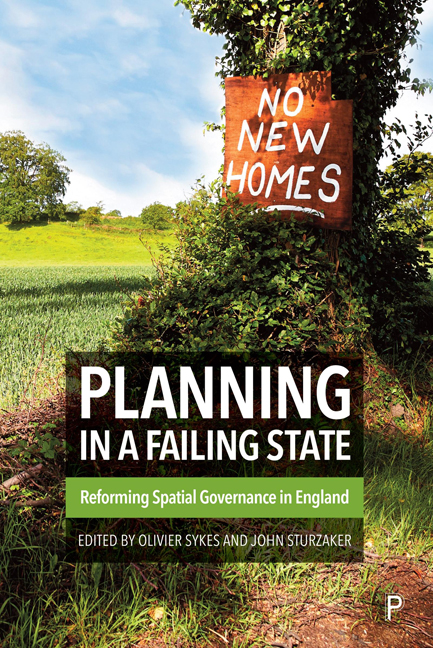Book contents
- Frontmatter
- Dedication
- Contents
- List of figures and tables
- Notes on contributors
- Acknowledgements
- 1 Introduction
- 2 The (housing) numbers game
- 3 Localism: the peccadillos of a panacea
- 4 Planning at the ‘larger than local’ scale: where next?
- 5 PD games: death comes to planning
- 6 Building beauty? Place and housing quality in the planning agenda
- 7 Zoning in or zoning out? Lessons from Europe
- 8 Planning and the environment in England, 2010–22: cutting ‘green crap’, Brexit and environmental crises
- 9 Stuck on infrastructure? Planning for the transformative effects of transport infrastructure
- 10 Conclusion
- Index
5 - PD games: death comes to planning
Published online by Cambridge University Press: 27 March 2024
- Frontmatter
- Dedication
- Contents
- List of figures and tables
- Notes on contributors
- Acknowledgements
- 1 Introduction
- 2 The (housing) numbers game
- 3 Localism: the peccadillos of a panacea
- 4 Planning at the ‘larger than local’ scale: where next?
- 5 PD games: death comes to planning
- 6 Building beauty? Place and housing quality in the planning agenda
- 7 Zoning in or zoning out? Lessons from Europe
- 8 Planning and the environment in England, 2010–22: cutting ‘green crap’, Brexit and environmental crises
- 9 Stuck on infrastructure? Planning for the transformative effects of transport infrastructure
- 10 Conclusion
- Index
Summary
Introduction
It is a truth universally acknowledged that a human must be in want of a healthy home. Planning has been tasked with enabling this want for over 70 years, yet in English planning’s current emaciated state, it is struggling to ensure that housing is healthy. The fortunes of England’s population are growing further apart (ONS, 2021). While all its citizens share the same human rights according to the International Convention on Economic, Social and Cultural Rights as part of the International Bill of Human Rights, the UK’s unwritten constitution does not actually include the ‘right to healthy housing’. Increasingly, it appears that the ability of citizens in England to actuate their international human right is devolved to their financial capacity. Variation in the quality of housing is not new, but the minimum quality for new housing development, which has been required since 1947, has been absent in much of a new form of housing development: permitted development.
Since 2010, there have been significant changes in the process of obtaining permission for much new housing development in England. Broadly, these deregulatory national changes have allowed the conversion and extension of housing that would not have been permitted through local planning permission.
This chapter explores the expansion of permitted development rights to allow the conversion of non-residential uses to homes. It does so with a particular focus on neighbourhood health, providing new evidence of the problematic assumption in permitted development that housing should be allowed regardless of local amenities and the built environment of existing buildings. Our neighbourhood-health-based approach should be considered complementary to the excellent extant analysis of the quality of the physical structures of dwellings by Clifford et al (2018), on which this analysis builds directly and for which it seeks to provide corroborating evidence (see, for example, Madeddu and Clifford, 2021).
A pastiche aside
Lizzy was looking forward to seeing her friend again. Travelling south from the fine county of Derbyshire, the train line cut through miles of green, purple and gold manicured moorland. Looking out the windows, which ran almost the full length of the train, Lizzy saw estates merge into pastureland, past isolated oaks and pylons strung together to provide electricity to disparate settlements. The train was quiet.
- Type
- Chapter
- Information
- Planning in a Failing StateReforming Spatial Governance in England, pp. 72 - 86Publisher: Bristol University PressPrint publication year: 2023



